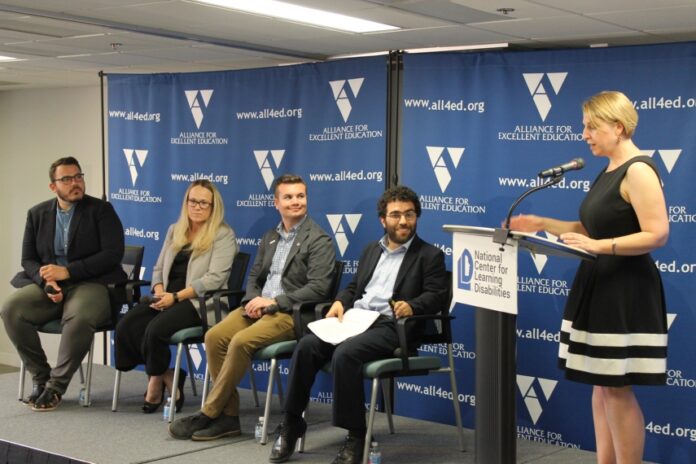For the past year, we have been exploring how self-advocacy skills and self-determination play a role in personalized learning. Self-advocacy skills allow students to advocate and communicate their rights and needs. Having self-advocacy skills is one thing that can lead to self-determination: an individual being empowered to actively make choices about their education and their life.
For students with disabilities, there are substantial benefits to developing these essential skills and capacities. For example, research shows that even though students with disabilities may be less likely to act with self-determination, there are interventions that can help students develop these capacities and benefit from them at school, in the workplace and in their personal lives.
We recently brought together a panel of experts to discuss the importance of self-advocacy skills and self-determination in personalized learning. Some of the questions we grappled with included why we don’t see these skills at the forefront of new education reform efforts like personalized learning and what can we do about it. Here’s what the experts said:
We must overcome biases and assumptions about what students with disabilities can do. Despite what we know about students with disabilities and their incredible potential, some professionals still operate under the misconception that students with disabilities cannot learn or accomplish as much as their peers without disabilities. As a result, students with disabilities are not always empowered to make active choices about their learning and lives. Every reform effort must begin with conversations at the school or district level about what educators believe students are capable of. Do you believe all kids can learn? If the answer to that is “yes,” then your initiative must reflect that belief in how it is designed and implemented.
Small interactions can lead to big change. For many students, one adult can make all the difference. For Elijah, it was a teacher. For Will, it was his mom. But without that one adult who believed in and advocated for them, Elijah and Will might have had very different life experiences. But what can we do for students with disabilities who may not find that champion? We must, of course, equip students with the skills they need to be their own advocates. But we can also set up structures that help facilitate connections between coaches or mentors to students who are navigating the K-12system.
You don’t have to reinvent the wheel. Too often when schools, districts, and states don’t need to start from square one when they begin a new education initiative. New initiatives can build from existing frameworks or past efforts. We can, for example, use research-based strategies like universal design for learning to make learning more accessible and engage more students, as a foundational part of any personalized learning effort. They don’t need to be separate efforts. Another example raised by panelist, Amanda Fitzgerald, is ASCA’s mindsets and behaviors for student success. If we have more counselors and educators taking these existing ideas seriously and incorporating them into their daily practices, we’d make up significant ground in implementing personalized learning approaches more inclusively.
Equity and inclusion are not automatic, but require thoughtful and intentional effort. As Joey Hunziker of CCSSO and others discussed, we can’t assume that any education reform strategy (like personalized learning) will address equity and inclusion without thoughtful effort on our part. If leaders have not been intentional and proactive in their efforts to build equity and inclusion into an educational initiative, opportunity gaps may very well widen, rather than close.
We hope you’ll take some time to watch this expert event and, if you missed it or want to see it again, you can watch it on Understood.org. Please join us and stay engaged in this essential conversation!
Provided by the National Center for Learning Disabilities.
© 2018 National Center for Learning Disabilities, Inc. All rights reserved. Reprinted with permission. For more information, visit NCLD.org.






